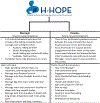Parents' Experiences With an Early Behavioral Intervention, H-HOPE, in the NICU and at Home: A Qualitative Study
- PMID: 40609008
- PMCID: PMC12322684
- DOI: 10.1097/ANC.0000000000001282
Parents' Experiences With an Early Behavioral Intervention, H-HOPE, in the NICU and at Home: A Qualitative Study
Abstract
Background: Early parent involvement in an infant's neonatal intensive care unit (NICU) stay has positive benefits for the parent, the preterm infant, and the parent-infant relationship. H-HOPE (Hospital to Home: Optimizing the Preterm Infant's Environment) is an early behavioral intervention that provides an innovative developmental approach and contributes to parents' opportunity to provide care for their infant in the NICU.
Purpose: To explore parents' experience with H-HOPE.
Methods: This qualitative study consists of one-on-one interviews with parents as part of a larger study investigating H-HOPE's implementation and effectiveness. Data from 38 parents encompassing 54 interviews are included in this analysis.
Results: Parents report experiencing many benefits from participating in H-HOPE, including an increase in confidence, understanding of infant cues, promotion of bonding, infant benefits, and improvement in relationships with staff. Facilitators to participation include teaching and support in the NICU, being able to be present regularly, family support, and positive infant responses. Barriers to participating in the NICU were infant condition and readiness, family and economic limitations, lack of parent training or readiness, and nurse availability and communication. A lack of time and infant readiness were barriers at home.
Implications for practice and research: Our findings highlight the importance of early behavioral interventions like H-HOPE that support parent-partnered care, which promotes parents' participation in their infants' care. NICU nurses play a critical role in facilitating parent participation and confidence. Future research should examine policies and programs to help enhance NICU nurses' readiness and ability to engage with and support parents.
Keywords: behavioral intervention; communication; engagement; infant care; neonatal intensive care units; parent perspective; parent-infant relationship; parents; premature; qualitative.
Copyright © 2025 by The National Association of Neonatal Nurses.
Conflict of interest statement
Figures
Similar articles
-
Neonatal Nurses' Understanding of the Factors That Enhance and Hinder Early Communication Between Preterm Infants and Their Parents: A Narrative Inquiry Study.Int J Lang Commun Disord. 2025 Jul-Aug;60(4):e70093. doi: 10.1111/1460-6984.70093. Int J Lang Commun Disord. 2025. PMID: 40653954 Free PMC article.
-
'I Did Not Know We Could Exercise This Small Premature Baby': Challenges Experienced by Parents While Implementing Early Intervention for Their Preterm Infants-A Qualitative Perspective.Child Care Health Dev. 2025 Mar;51(2):e70045. doi: 10.1111/cch.70045. Child Care Health Dev. 2025. PMID: 39912601 Free PMC article. Clinical Trial.
-
Parent Perspectives of Co-Occupations in Neonatal Intensive Care: A Thematic Review of Barriers and Supports.OTJR (Thorofare N J). 2025 Jul;45(3):378-387. doi: 10.1177/15394492241271220. Epub 2024 Aug 19. OTJR (Thorofare N J). 2025. PMID: 39155825 Free PMC article.
-
Parents' experiences of psychotherapeutic support on the neonatal unit: A mixed methods systematic review to inform intervention development for a multicultural population.Nurs Crit Care. 2025 May;30(3):e13194. doi: 10.1111/nicc.13194. Epub 2024 Oct 28. Nurs Crit Care. 2025. PMID: 39467007 Free PMC article.
-
Sound reduction management in the neonatal intensive care unit for preterm or very low birth weight infants.Cochrane Database Syst Rev. 2015 Jan 30;1:CD010333. doi: 10.1002/14651858.CD010333.pub2. Cochrane Database Syst Rev. 2015. Update in: Cochrane Database Syst Rev. 2020 Jan 27;1:CD010333. doi: 10.1002/14651858.CD010333.pub3. PMID: 25633155 Updated.
References
MeSH terms
Grants and funding
LinkOut - more resources
Full Text Sources
Medical



